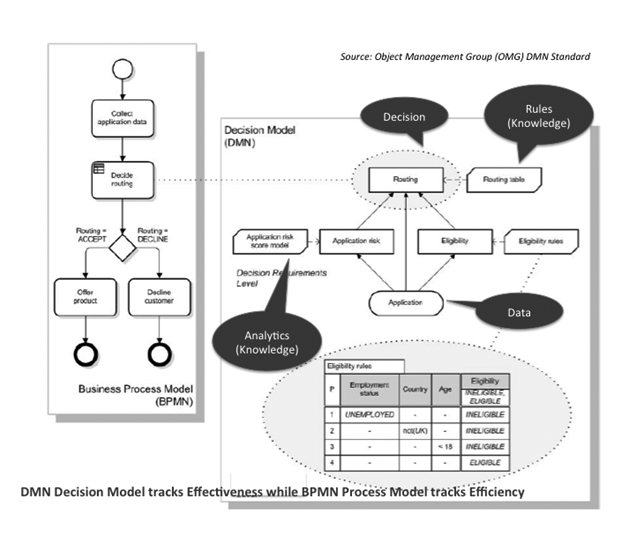Decision modeling adds explicit effectiveness metrics to the more generally accepted efficiency metrics generated by business process modeling,giving the full picture to the Executive Suite. Process efficiency measures throughput, costs, error-rates and similar, while process effectiveness measures whether the process is fulfilling its purpose – picking the most profitable customers, for example. Most business process management metrics focus on efficiency measures since effectiveness measures generally depend on the decisioning logic embedded within processes. Explicit decision modeling turns a spotlight on process goals and associated effectiveness metrics. Executive leadership can now balance and trade-off efficiency measures like throughput with effectiveness measures like profitability.
Why doesn’t BPM get enough Executive attention?
Business Strategy gets executed in Business Processes. So, success is measured by first translating strategy objectives into measurable targets and then linking them to measurable process metrics. This ‘metrics hierarchy’ does work to some degree but it is an unreliable connection between planning and execution since most process metrics are based on efficiency, and not on effectiveness.
Efficiency metrics like output-per-unit or errors-per-transaction or cost-per-shipment measure how well a defined process is operating in terms of throughput. Effectiveness metrics like margin-per-sale or default-probability-per-order measure how well a defined process is operating in terms of its intended goal.
An insurance Claims Process can be very efficient at paying out claims – large volumes, low errors and low costs, but it can be very ineffective if it is not picking the right claims to process. The processing logic used to pick the right claims to process does not have an in-flight real-time measurable metric. This lack of an explicit effectiveness metric is then compensated for by running reports after the fact.
While the CEO and CFO want to see both the efficiency and effectiveness metrics on their dashboards, they are likely to pay more attention to effectiveness measures. Process efficiency can be improved incrementally but almost all business decision making is to make the process more effective. Going back to the Claims Processing example, executive decision making will focus first on how to reduce bad claims payments and then on cost savings by increasing throughput.
So, BPM does not get the attention it deserves because it is generally not set up to generate the sought-after effectiveness metrics.
How does Business Decision Management solve the problem?
Business Decision Modeling uncovers how decisions are being made within business processes. One of the key techniques to discover, define and describe these decisions is through effective measures. What makes this process effective? What decision needs to be made well for that to happen? How can we tell whether the decision being made is a good one or not? Are there threshold targets to be met before the process is allowed to finish executing? The answers to these questions are formally documented and shared to build consensus on decision making models – ultimately resulting in well-understood process effectiveness measures directly tied to process execution.

Decision modeling is done alongside process modeling in an iterative cycle until both elements are clearly defined along with the respective effectiveness and efficiency measures. These metrics can then be delivered to Executive Dashboards through BI technology.
CEOs, CFOs and other business managers now have a complete picture of how strategy is being executed in business process management systems. And more importantly, they now have the visibility to consider trade-offs between efficiency and effectiveness.

















